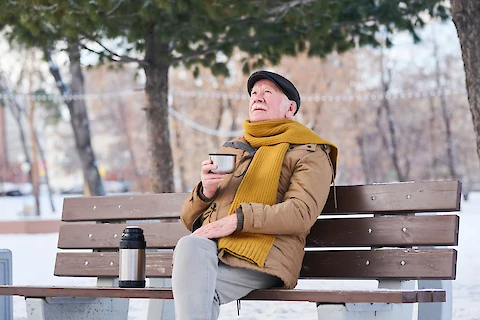
Winter often means beautiful snowy landscapes, cozy evenings by the fire, and seasonal joys. However, it can also present unique health challenges for seniors, particularly in the realm of hydration. It's critically important for seniors to maintain adequate hydration, but the decreased thirst sensation and potential physiological changes associated with aging can pose notable challenges.
Why Seniors Are at Higher Risk of Dehydration
As we age, our bodies undergo several changes that can increase the risk of dehydration. Key among these is the natural decline in total body water content, making seniors more susceptible to dehydration than younger individuals. Additionally, some seniors may not feel or recognize thirst as readily, leading to insufficient fluid intake.
The Impact of Winter Weather on Hydration
Winter can be a sneaky season when it comes to hydration. The cooler temperatures can blunt thirst, causing seniors to drink less than they normally would. Furthermore, artificial heating systems used to warm homes can lead to dry indoor air, which might increase the risk of dehydration. Despite the cooler weather, the body continues to lose water through normal biological processes, underlining the importance of adequate hydration year-round.
Recognizing Signs of Dehydration in Seniors
Spotting dehydration in seniors early is key to preventing serious complications. Common signs include dry mouth and tongue, less frequent urination, dark-colored urine, fatigue, dizziness, and confusion. If any of these symptoms are observed, it's crucial to take immediate steps to rehydrate and seek medical advice if necessary.
Best Types of Fluids for Seniors
Water is, of course, the best source of hydration. All fluids count towards hydration, not just water. Herbal teas and clear broths can be warm and comforting options for winter months. Fresh fruits and vegetables with high water content, such as melons, oranges, and cucumbers, can also aid hydration. While caffeine and alcohol could seem like warming alternatives, they can act as diuretics, speeding up fluid loss, and must be consumed in moderation.
Practical Tips and Strategies for Ensuring Adequate Fluid Intake
Creating a routine can significantly help seniors maintain their fluid intake. Start by offering fluids at regular intervals throughout the day, not just at meal times. You might find it helpful to fill a jug of water in the morning and encourage your loved one to sip from it during the day. If they find water boring, try adding natural flavors like a slice of lemon or a dash of cranberry juice.
As caregivers, you need to be aware of how much fluid seniors are consuming each day. Setting hydration goals and monitoring their intake can help ensure they are getting sufficient fluids. Remember, the needs of each individual can vary, and it's important to tailor strategies to their preferences and health requirements.
Senior Helpers Southern Utah Helps Seniors Stay Hydrated Throughout the Year
Nothing should come in the way of seniors enjoying their winter season, certainly not dehydration. By understanding why seniors are more prone to dehydration and employing practical strategies, we can ensure they stay well-hydrated throughout this winter season and beyond. If you need more advice or assistance with caregiving in Cedar City, Hurricane, Saint George, Mesquite, or Vernal, don't hesitate to contact us at Senior Helpers Southern Utah. We're here to help you navigate through the challenges of senior care, one step at a time.